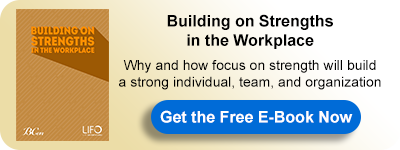Strengths in the Workplace
“You can’t build performance on weaknesses; you can build only on Strengths.”
– Peter Drucker
Talent management is not only one of the most key factors in managing any business, but also it became an important part of what a business stands for. We see how corporates thrive to be better employers, and invest in its talent management strategies to acquire the better talents and utilize them to get the best performance. Do you notice that it turned into talent management and it’s no more referred to as Human resources management? Did you ever think why?
This term was coined by McKinsey & Company following a 1997 study, is usually associated with competency-based management.
Modern workers, in particular, want to work for a company that offers new horizons and challenges. They yearn to do more and become more. And if their workplace doesn’t provide these opportunities, they’ll find one that does. In fact, the No. 1 reason people change jobs today is for “career growth opportunities.”
This needs to adopt an effective approach for employees’ development than the traditional one, and this what makes the strength-based approach is one of the most efficient approaches in managing your talents and helps employee’s empowerment and utilizes his self-awareness to achieve his wellbeing, and helps businesses to achieve better business outcomes.
Why Focus on Strengths?
One approach to understanding individuals’ strengths lies in the concept of recognizing each person’s “core gifts.” This language is important in its implicit valuing of individual attributes. By not emphasizing deficits and problems, providers create an opportunity to see possibilities, options and opportunities for partnership change and improvement. Focusing solely on deficits in the absence of a thoughtful analysis of strengths disregards the most critical resources an individual has on which to build his or her efforts to advance his or her recovery.
Donald Clifton pioneered the study of strengths in the workplace, affirming through decades of research that employees who use their strengths on the job are more likely than others to be intrinsically motivated by their work, simply because it feels less like work to them.
The strength-based approach allows for habitable conditions for a person to see themselves at their best, in order to see the value they bring, by just being them. Then moving that value forward to capitalize on their strengths rather than focusing on negative characteristics.
Team members who know each other’s strengths more effectively relate to one another, avoiding potential conflicts and boosting group cohesion. Strengths-based development immediately changes their conversations. It creates more positive dialogue, and it boosts the team’s overall engagement and performance.
For more about this topic, download our latest book “Building on Strengths in the Workplace“ for FREE:

